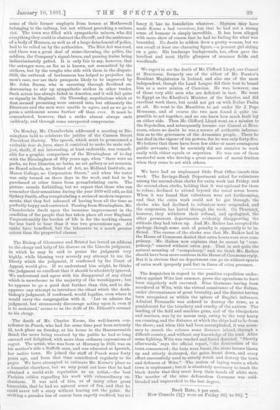On Monday, Mr. Chamberlain addressed a meeting at Bir- mingham
held to celebrate the jubilee of the Cannon Street Provident Society. The speech, which must be pronounced a veritable tour de force, since it contrived to make its main sub- ject, thrift, if not interesting, at least endurable, was remark- able for a graphic comparison of the Birmingham of to-day with the Birmingham of fifty years ago, when " there were no parks, no free libraries, no baths, no art gallery or art museum, no Board schools, no School of Art, no Midland Institute, no Mason College, no Corporation Street," and when the water was only turned on three days in the week, and had to be purchased at other times from perambulating carts. The picture sounds forbidding, but we expect that those who can remember their sensations during the year 1830 will add, as did Sydney Smith, after recapitulating a series of modern improve- ments, that they feel ashamed of having been all the time so perfectly happy and contented. Passing from Birmingham, Mr. Chamberlain dwelt upon the immense improvement in the .condition of the people that has taken place all over England. Unquestionably the burden of life is for the working classes far less hard to bear than it was two generations ago. All ranks have benefited, but the labourers to a much greater extent than the propertied classes.
































 Previous page
Previous page